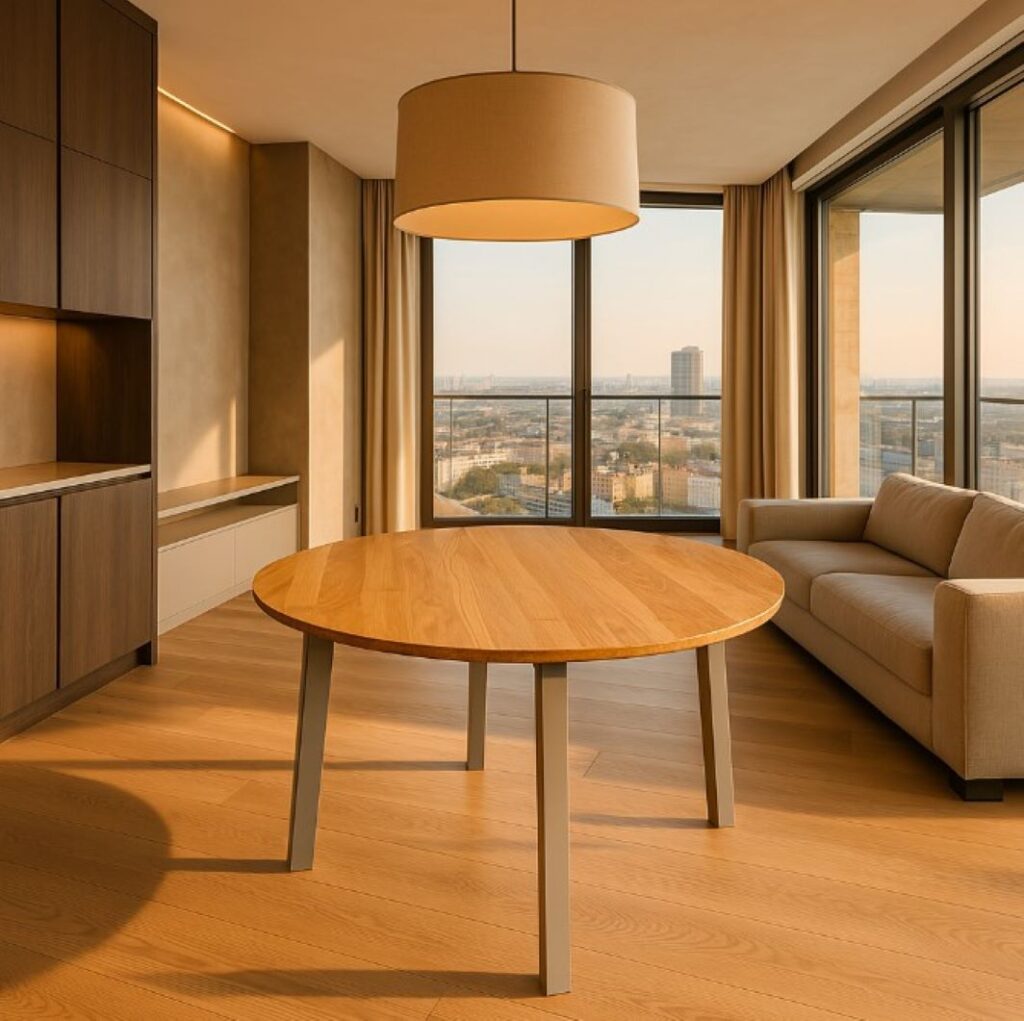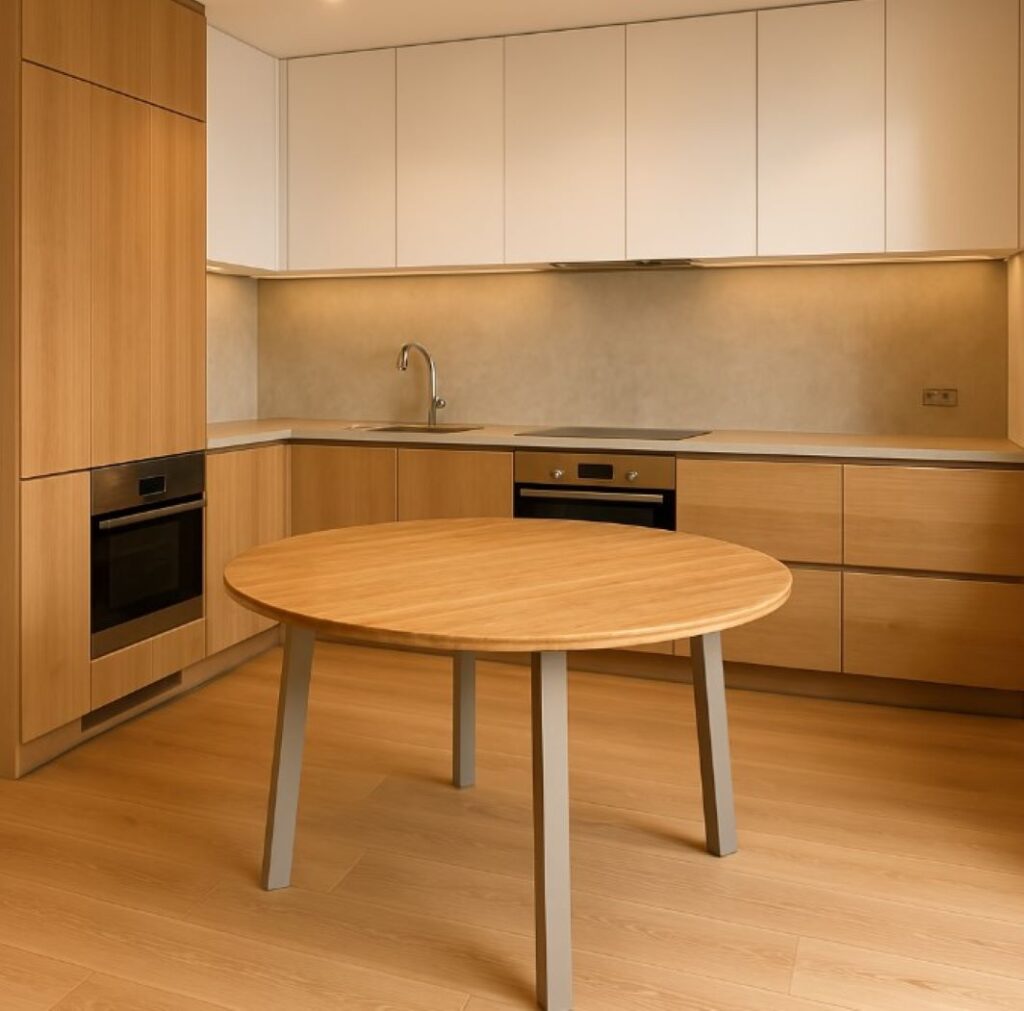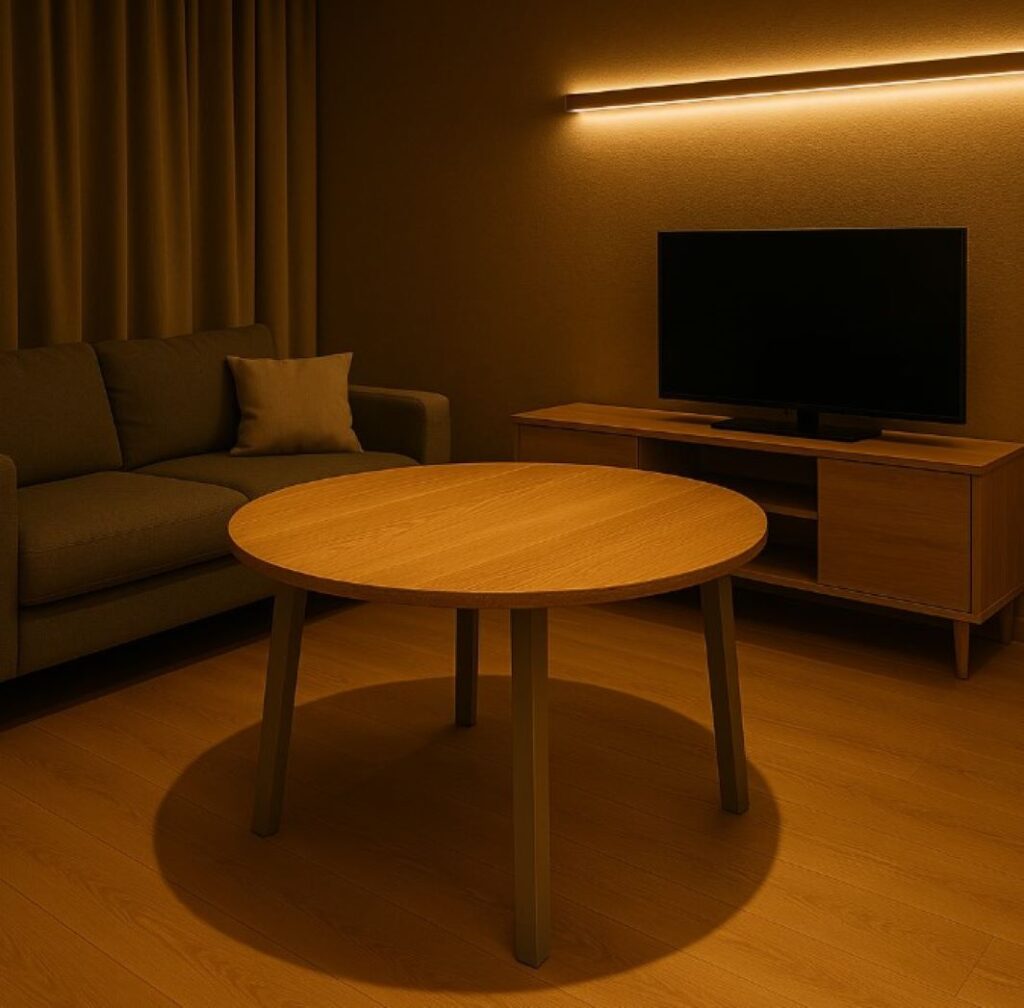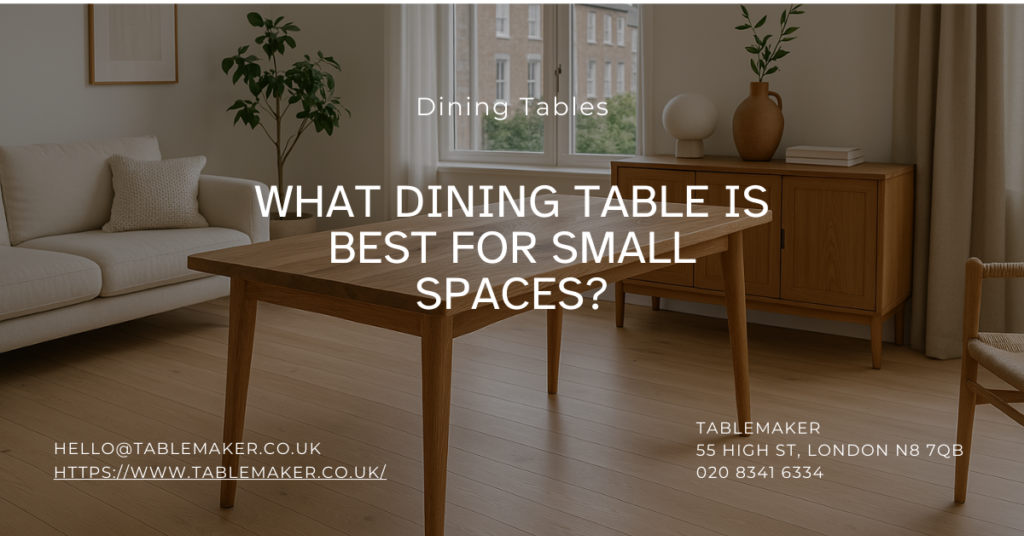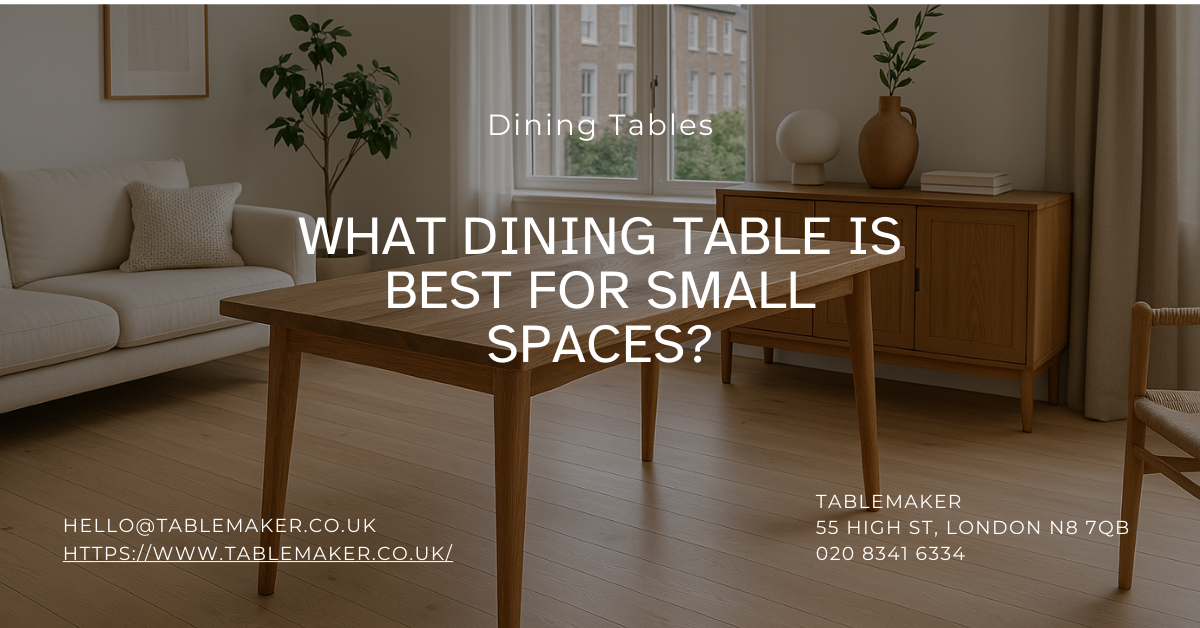
What dining table is best for small spaces?
What’s the best type of dining table for a small area?
The best dining table for a small space is one that saves room without limiting function or comfort. Round tables, extendable models, folding designs and tables with hidden storage are excellent choices. The right shape, size and features make all the difference when space is tight, allowing you to create a practical and welcoming dining area without overcrowding your home.
In this article about dining tables for small areas we have covered
- What are the best custom wood desk tops for home offices?
- Why does the shape of your dining table matter in a small space?
- What size dining table should you get for a compact dining room?
- Extendable dining tables: A flexible favourite
- Round dining tables: Practical and sociable
- Folding dining tables: Smart for multifunctional spaces
- Bench seating: A clever alternative to chairs
- Choosing materials that suit smaller rooms
- Add mirrors and lighting to open up the space
- Final thoughts
- FAQs
- Contact Tablemaker
Why does the shape of your dining table matter in a small space?
The shape of a dining table plays a key role in how well it fits into a compact room. Round tables are often the easiest to work with. Their curved edges make them safer and better suited to corners or open-plan layouts, encouraging natural flow around the room. A small round table with a pedestal base is particularly effective because there are no legs to get in the way, making it easier to seat more people comfortably.
Rectangular tables suit galley kitchens and narrow dining rooms. When placed lengthwise against a wall, they free up floor space and still offer plenty of room for plates, glasses and serving dishes. Many UK homes, especially Victorian and Edwardian terraces, benefit from this layout. Square tables can be pushed against walls when not in use, and some can even convert into rectangular tables using hinged leaves.
Corner dining tables are another smart solution, particularly useful in open-plan homes or kitchens with awkward layouts. When paired with L-shaped bench seating, these tables create a cosy and efficient breakfast area in an otherwise unused corner.
What size dining table should you get for a compact dining room?
A small dining table usually seats two to four people. If you occasionally have guests, look for an extendable table with hidden or removable leaves. This type of table gives you the flexibility to host dinners or family lunches without taking up extra space every day.
Measurements matter. A 70 to 90 centimetre wide table provides enough space for two place settings across from each other with enough room in the centre for food or décor. Check your dining chairs too. Armless chairs tuck under the table more easily and make the area feel less cluttered. Folding and stackable chairs are ideal when extra guests come over.
Drop-leaf tables are making a comeback due to their ability to fold away completely or double as consoles. These are ideal for renters or anyone needing to reclaim floor space after meals.
Pro Tip: Measure your available space before choosing a table – including the chairs – to make sure everything fits with enough room to move around comfortably.
Extendable dining tables: A flexible favourite
Extendable dining tables are popular in flats, cottages and small family homes. They allow everyday use with a compact footprint but can easily expand when needed. Look for models that offer drop leaves, butterfly extensions or centre panels.
Matching chairs complete the look and improve function. Some collections come with perfectly sized seating, such as benches that tuck under the table or armless chairs that slide in flush.
For further insight into how adaptable furniture can improve smaller rooms, the BBC has covered the topic of space-saving furniture in UK homes, including multi-use dining areas and foldable options.
Round dining tables: Practical and sociable
Round tables take up less space and encourage conversation. With no corners to navigate around, they often fit better in small dining areas. For example, the Hanworth round adjusting dining table can be used at different heights, suiting both dining and informal use. Families often prefer round tables due to the absence of sharp corners, which is especially useful with children.
Choosing a table with a glass top adds the illusion of more space. The see-through surface allows light to pass through and keeps the room feeling open. Pair with lightweight chairs in natural materials like rattan or oak to complement the airy style.
Modular dining tables are also becoming more common. These allow for seat or surface extensions to be added as needed. They work well for growing families or people who often host.
Folding dining tables: Smart for multifunctional spaces
In homes where the dining area doubles as a study or playroom, folding tables provide practical solutions. They can be folded and stored when not in use, turning the space back into a living or working area. Look for styles that double as consoles or desks. These hybrid pieces allow you to change the room’s function without moving heavy furniture.
Tables with storage shelves or drawers also help in smaller rooms. These hidden compartments can hold placemats, cutlery or even paperwork, keeping clutter off surfaces and helping you keep the space tidy.
Some dining tables now include tech features such as built-in USB charging ports or integrated cable management, which suit remote workers and students using the same table for different tasks throughout the day.
As covered by The Guardian’s guide to flexible living spaces, integrated technology and multipurpose furniture are growing trends among city homeowners.
Pro Tip: A central pedestal base offers more legroom and better use of space than traditional four-leg designs, especially in tighter layouts.
Reach out for space-saving dining tables in London & the UK
Bench seating: A clever alternative to chairs
Benches take up less space and offer more flexibility than traditional dining chairs. They can be pushed entirely under the table when not in use. In smaller homes, this means fewer obstacles in the room. Many UK households now use benches along one or both sides of the table to create casual but practical dining areas.
Combining a bench with a round table in a corner nook adds both charm and function. Add cushions or a backrest against the wall for comfort. This creates a cosy spot for breakfast, coffee or evening meals.
Choosing materials that suit smaller rooms
Material choice affects both the look and practicality of your table. Lighter woods such as oak or acacia keep the space looking fresh. Painted finishes in soft colours like sage green or dove grey reflect more light and help smaller rooms feel more open. Tables made from heat and stain-resistant hardwoods, like those found in the Florence range, add durability as well as style.
Hardwearing surfaces are important, especially in multi-use spaces. Tables often double as desks or study areas in flats or open-plan homes. A lacquered or oil-protected finish ensures the table stays clean and presentable with minimal maintenance.
Many buyers are also opting for furniture made from sustainable materials. Look for FSC-certified wood and environmentally responsible finishes if sustainability matters to you.
Add mirrors and lighting to open up the space
Wall mirrors bounce light around and create a sense of depth. They make a dining area feel larger and brighter, especially when placed opposite windows or light sources. Pendant lighting above the table draws the eye upward and adds warmth to the room.
For inspiration on accessories and lighting, see our dining room accessories section.
Final thoughts
The right dining table makes a big difference in a small room. Round tables, extendable styles, folding options and designs with hidden storage all offer practical ways to make the most of limited space. Paired with the right seating and accessories, your small dining area can become one of the most welcoming and well-used parts of your home.
Whether you are living in a city flat, a cottage kitchen or a family terrace, the right table creates a comfortable, usable dining area without overcrowding. For more ideas, browse our full collection of space-saving dining sets and accessories.
FAQs
What is the best type of table for a small kitchen?
A round or extendable table is usually the best choice for a small kitchen. These designs take up less space and can adapt for more people when needed.
Are benches better than chairs in small dining rooms?
Benches save space by tucking neatly under the table and can seat more people comfortably. They are also easier to move and store.
How can I make my small dining area look bigger?
Use light colours, add mirrors, and choose furniture with slim profiles or glass elements to open up the space visually.
Can I use a dining table as a desk?
Yes. Many small dining tables are used as workstations in homes with limited room. Extendable or folding designs work particularly well.
What chairs go best with a small dining table?
Armless, stackable or folding chairs are ideal. You can also use benches or stools that store easily when not in use.
Need a Small Dining Table or Desk in North London?
If you’re in North London and searching for a made-to-measure dining table or desk that fits a small space, we’d be happy to help. At Tablemaker, we build solid wood tables in the exact size you need — down to the centimetre — with flexible finishes and compact-friendly designs.
Whether you’re furnishing a modern flat in Islington, a cosy kitchen in Crouch End, or a studio near Finsbury Park, our team is here to offer straightforward advice and solutions. We also regularly deliver to customers in Chelsea, Kensington, Westminster and Mayfair, where high-spec interiors often call for furniture that’s both functional and smart.
Visit our workshop in Hornsey or get in touch with your measurements. You can customise online or speak with someone directly — no pressure, no upselling, just honest help.
Showroom and Workshop
55 High Street, Hornsey, London N8 7QB
Call: 020 8341 6334
Email: [email protected]
Open: Mon–Wed: 9 am–3 pm, Thurs–Fri: 9 am–4 pm
Closed: Sat & Sun
Browse or customise online: www.tablemaker.co.uk
Tablemaker
55 High St, London N8 7QB
02083416334
HVQM+58 London

